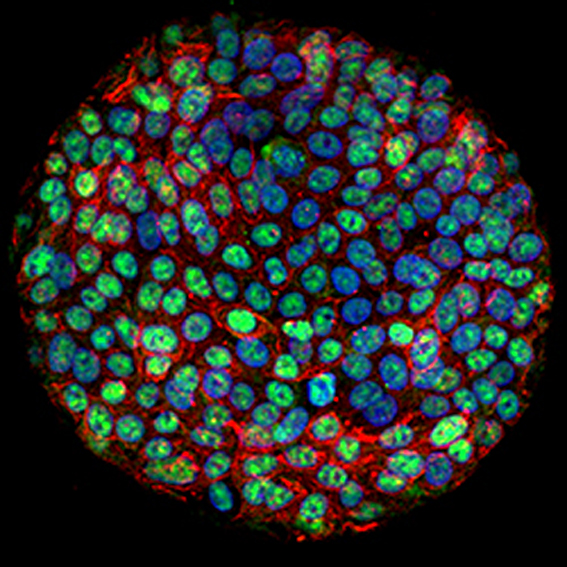
Pancreas organoid with ductal marker (red) and pancreatic marker (green). Georgakopoulos et al.
The research group of Meritxell Huch, research group leader at the MPI-CBG and the University of Cambridge’s Gurdon Institute, and collaborators share their system for growing and maintaining pancreas organoids in culture, providing an abundant source of pancreas ductal cells that retain the characteristics of the tissue-of-origin.
Abstract from original paper
Background: Pancreatic organoid systems have recently been described for the in vitro culture of pancreatic ductal cells from mouse and human. Mouse pancreatic organoids exhibit unlimited expansion potential, while previously reported human pancreas organoid (hPO) cultures do not expand efficiently long-term in a chemically defined, serum-free medium. We sought to generate a 3D culture system for long-term expansion of human pancreas ductal cells as hPOs to serve as the basis for studies of human pancreas ductal epithelium, exocrine pancreatic diseases and the development of a genomically stable replacement cell therapy for diabetes mellitus.
Results: Our chemically defined, serum-free, human pancreas organoid culture medium supports the generation and expansion of hPOs with high efficiency from both fresh and cryopreserved primary tissue. hPOs can be expanded from a single cell, enabling their genetic manipulation and generation of clonal cultures. hPOs expanded for months in vitro maintain their ductal morphology, biomarker expression and chromosomal integrity. Xenografts of hPOs survive long-term in vivo when transplanted into the pancreas of immunodeficient mice. Notably, mouse orthotopic transplants show no signs of tumorigenicity. Crucially, our medium also supports the establishment and expansion of hPOs in a chemically defined, modifiable and scalable, biomimetic hydrogel.
Conclusions: hPOs can be expanded long-term, from both fresh and cryopreserved human pancreas tissue in a chemically defined, serum-free medium with no detectable tumorigenicity. hPOs can be clonally expanded, genetically manipulated and are amenable to culture in a chemically defined hydrogel. hPOs therefore represent an abundant source of pancreas ductal cells that retain the characteristics of the tissue-of-origin, which opens up avenues for modelling diseases of the ductal epithelium and increasing understanding of human pancreas exocrine biology as well as for producing insulin-secreting cells for the treatment of diabetes.
For lay explanation of the paper see the BMC Blog:
Human Pancreas Organoids: A step closer to understanding biology & treating disease by Nicole Prior, Nikitas Georgakopoulos & Meritxell Huch
Research funded by: European Commission Horizon 2020 (H2020) Research Infrastructures. Adaptation of the culture system for human cells was funded by the LSFM4LIFE programme.
Nikitas Georgakopoulos, Nicole Prior, Brigitte Angres, Gianmarco Mastrogiovanni, Alex Cagan, Daisy Harrison, Christopher J. Hindley, Robert Arnes-Benito, Siong-Seng Liau, Abbie Curd, Natasha Ivory, Benjamin D. Simons, Inigo Martincorena, Helmut Wurst, Kourosh Saeb-Parsy & Meritxell Huch: Long-term expansion, genomic stability and in vivo safety of adult human pancreas organoids. BMC Developmental Biology volume 20, Article number: 4 (2020) DOI: 10.1186/s12861-020-0209-5